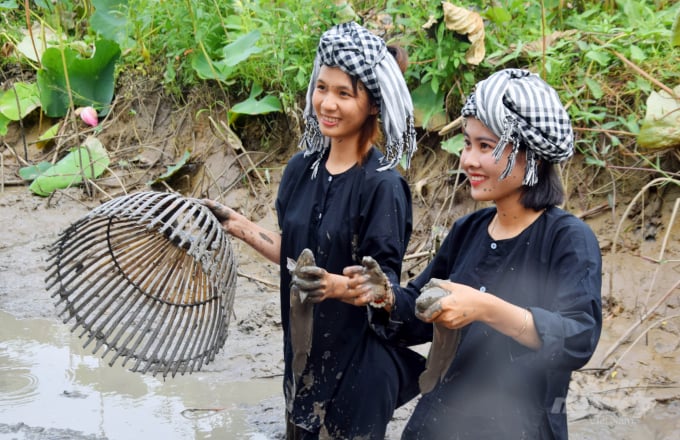May 20, 2025 | 12:30 GMT +7
May 20, 2025 | 12:30 GMT +7
Hotline: 0913.378.918
May 20, 2025 | 12:30 GMT +7
Hotline: 0913.378.918

Tourists experience catching fish. Photo: Le Hoang Vu.
In recent years, agricultural and rural tourism has flourished as a result of the introduction of farm stay models in a number of locales that have proven to be effective and have become a tourist attraction, contributing significantly to rural economy development in a sustainable direction.
According to unconfirmed statistics, by the first half of 2023, the entire nation had nearly 500 agricultural and rural tourism models in operation. However, farm stays have encountered numerous challenges and limitations in planning and development direction, assessment of quality criteria, and management capacity.
Promoting rural tourism is one of the focal solutions and missions of the National Goal Program in new rural buildings for the period 2021-2025, based on a fundamental change from agricultural production to rural economy development, thereby assisting localities in implementing new rural criteria effectively and sustainably.
With the approval and direction of the Ministry of Agriculture and Rural Development, on September 22 in Ho Chi Minh City, Vietnam Agriculture News and the Center for Rural Development - Saemaul Undong, University of Social Sciences and Humanities, National University of Ho Chi Minh City organized an offline and online Forum titled "Promoting agricultural tourism."
Tran Thanh Nam, Deputy Minister of Agriculture and Rural Development, attended and presided over the forum, which was also attended by provincial/city leaders' representatives; Departments of Agriculture and Rural Development, Departments of Culture, Sports, and Tourism of localities.
With more than 200 guests registered to attend in person and nearly 500 online requests, the forum attracted representatives of businesses participating in the OCOP Program, cooperatives, experts, scientists, and lecturers, students, travel businesses, managers in the fields of agriculture, new rural construction, tourism, households, artisans, and central and local news and press agencies.
Mr. Tran Thanh Nam, Deputy Minister of Agriculture and Rural Development; Ms. Ngo Thi Phuong Lan, Rector of the University of Social Sciences and Humanities, Vietnam National University, Ho Chi Minh City; and Mr. Nguyen Ngoc Thach, Editor-in-Chief of Vietnam Agriculture News, Head of the Executive Team of the 970 Agricultural Product Connection Forum chaired the Forum.
Mr. Tran Cao, Deputy Editor-in-Chief of Vietnam Agriculture News and Member of the 970 Agricultural Product Connection Forum's Executive Team, and Ms. Ngo Thi Thu Trang, Deputy Director of the Center for Rural Development - Saemaul Undong, University of Science and Technology Faculty of Sociology and Humanities, Ho Chi Minh City National University, co-hosted the Forum.
According to experts, there are numerous forms of rural tourism in Vietnam today, including ecotourism, agriculture tourism, community tourism, cultural tourism, and tourism in craft villages. These kinds of rural tourism contribute to the growth of the rural economy and foster cohesion and pride in a beautiful countryside, which each local resident experiences through the tourism products he or she wishes to market to tourists.
In addition, the strength of local agricultural products to introduce to visitors will accomplish the dual objectives of boosting tourism and improving agricultural product consumption. This is the intent and purpose of the Forum on "Promoting Agricultural and Rural Tourism Attached to Agricultural Specialties and OCOP Products Consumption," as expressed by the Organizing Committee.
This forum is a conduit connecting scientists, experts, managers, and travel businesses with localities, connecting and proposing trade promotion solutions for rural tourism products, promoting the consumption of agricultural specialties and OCOP products, and developing rural tourism activities in-depth within the current context.
As a country having around 65.6 percent of its population reside in rural areas, which are home to tranquil natural scenery and distinct cultural and historical values, Vietnam has a huge advantage in developing rural tourism. Therefore, rural tourism has been seen as an encouraging trend for the country’s hospitality sector in the coming time.
The countryside in Vietnam covers a large area, stretching across localities and regions, with diverse climates, terrains, cuisines, and cultural backgrounds. It also hosts on its territory natural forests, mountains, rivers, lakes, villages, rice fields, orchards, ancient temples, and communal houses.
Each village in the countryside boasts unique cultural practices, traditional folk festivals, and assorted craft villages. People in rural areas are friendly, sincere, and kind. These lay a very important foundation for making rural tourism more attractive to domestic and foreign travelers.
According to statistics from the World Tourism Organisation, rural and ecological tourism accounts for around 10 percent of the global tourism sector, with revenue of about 30 billion USD per year globally. In addition, the annual growth rate of rural tourism is from 10-30 percent, while that of traditional tourism is only 4 percent.
Translated by Linh Linh

(VAN) In 2024, over 295 million people across 53 countries and territories faced acute hunger—an increase of almost 14 million people compared to 2023, while the number of people facing catastrophic levels of hunger reached a record high.

(VAN) World Environment Day 2025 (June 5) carries the theme 'Beat Plastic Pollution' continuing to emphasize the global urgency of addressing the plastic waste crisis.

(VAN) This was the assessment shared by experts at the workshop titled 'Assessing the Role and Potential of Low-Emission Rice Production Systems in Vietnam,' held on the morning of May 19.

(VAN) Cai Rong Port is the fisheries control center of Quang Ninh, helping to monitor fishing vessels, combat IUU fishing, and remove the EC's 'yellow card'.

(VAN) The German Agricultural Society (DLG) explores the possibility of establishing a mechanization service center in Vietnam’s Mekong Delta to support farmers in accessing and utilizing advanced machinery.

(VAN) On May 16, the Department of Water Resources Management, in collaboration with the Food and Agriculture Organization of the United Nations (FAO), held a signing ceremony for the GEF-8 project document.

(VAN) Food safety, mechanization, vocational training, and market opening are key areas of cooperation expected between the Vietnamese Government and the Federal Republic of Germany.